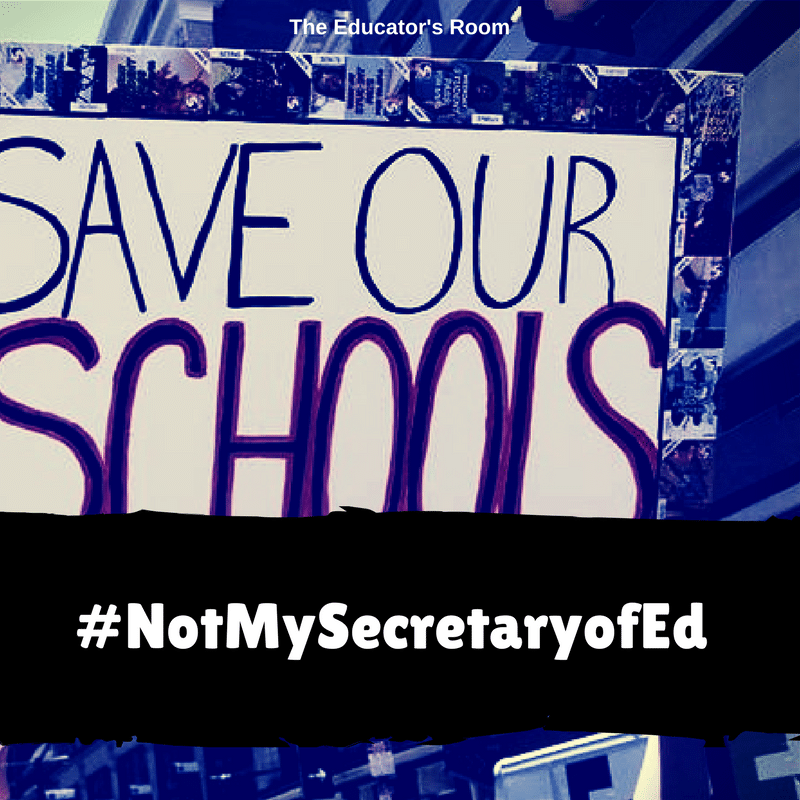There is a difference between “government” and “politics.” The former regards the design of a specific seat in our system; what power is vested in it, and what checks balance that power. The latter regards what butt happens to occupy that seat at a specific time. The butts change, typically per Presidential administration, but the seat’s power remains the same. While the butt gets sensationalized and obsessed over in media, the seat remains unchanged and illustrative of our Founders’ genius.
At least that’s what I used to think.
I hate politics. I honestly do. The bickering, the partisanship, the uncompromising stubbornness. The focus on personality and character, rather than on policy and power. Every day seems to be another doomsday call. The US will implode at any time — all because the wrong individual happens to temporarily occupy one single seat of our vast government design. Sigh. Eye roll. Who cares?
Then Betsy DeVos was nominated as our new Secretary of Education. Then I saw her Senate confirmation hearing. Then I realized the “deplorable” impact of having her butt occupying that seat can have on my classroom and my students.
“Does a federal bureaucrat really have THAT much effect on your classroom?” the nay-sayers retort.
Um, yes. Yes, the Presidential cabinet Secretary of the Department of Education does indeed have a significant effect on my classroom. And here’s why.
Education used to be a state-level thing. Our federalist system dictates a difference between enumerated powers: those specifically listed in Art. I, Sect. 8 of the Constitution which limit the responsibility of national government; and reserved powers: generically stated in the 10th amendment as, “The powers not delegated to the United States by the Constitution” — so, a catch-all for everything not enumerated. Political scientists have understood reserved powers to broadly include the categories of health, safety, and morals (collectively known as the “police powers”), so pretty much anything that regards intrastate issues and unique state personality. Education curriculum standards, teacher credential requirements, student performance assessments, and so forth have then traditionally been considered the purview of the state.
However, increasingly so, education has moved from a reserved power to a concurrent power — something over which BOTH the national and state government exercise power. To an extent, this makes sense: as we become a more globalized world, it is imperative that all American children graduate with relatively the same skills that position them equally in the job market. A student in California should not be at a higher advantage than a student in Oregon, just because one student happened to be raised in California.
Thus, in 1980, the United States Department of Education was instituted. And there forward, the federal government begun creating policies that impact curriculum, credentialing, assessments, and so forth. Some of these policies are innocuous, some are even beneficial — but some are No Child Left Behind.
[bctt tweet=”Some of these policies are even beneficial — but some are No Child Left Behind” username=”EducatorsRoom”]
If you are a teacher, you just felt that shiver down your spine. NCLB, passed with overwhelming bipartisan support in 2001, had good intentions. Every child should succeed! Leave none behind! But how will we know if we left anyone behind? We need data — and crap-tons of it — to analyze. And how will we collect these data? Test all the children about all the things!
So began a new era of mile-wide, inch-deep instruction, designed to cover as much content as possible to prepare students to succeed on multiple multiple-choice exams. States had some degree of autonomy over assessment choice and application, and states still dictated their official curriculum standards — but better national exam performance led to more federal dollars being allocated to that state, and so the states often complied to federal mandates. (This was the era during which I went through the public education system. The answer is always “c,” right?)
But the tides shifted gradually following 2009’s adoption of Common Core. State curriculum standards generally remained the same, but the federal assessments were changing. The emphasis moved away from focus on content to focus on skills. Teachers (and district offices, and credential programs, and required professional development) adapted accordingly, feeling pressure to change NCLB-era lessons to fit more with reading skills, writing skills, and evidence-analysis skills.
In other words, the policies and directives supported by and created in the United States Department of Education hugely impact what and how I am “allowed” to teach. It is unlikely a federal employee will drop into my classroom and chastise me if I’m off message, but it IS likely my school and district will require me to do and teach certain things. It becomes a hierarchy of pressure: feds exert pressure on states, which exert pressure on counties, then districts, then schools, then teachers. The chain of accountability for following federal mandates, then, becomes localized — and thus my classroom is directly impacted.
[bctt tweet=”The policies created in the Dept of Ed hugely impact what and how I am “allowed” to teach” username=”EducatorsRoom”]
Can’t the state (or county or district) say “screw it; we do what we want”? Can’t they just ignore the federal directives? Yes and no. Yes, a state can technically reject a federal mandate (and a few states did so in the first years of Common Core implementation) — but in doing so, they also reject a lot of money.
Since 1913’s ratification of the 16th amendment, the federal government can directly collect income tax from its citizens. This used to be just a reserved power, wherein the federal government raised revenues by taxing states. With the 16th amendment, though, the federal government found itself with more money than it needed, so it kicked a bunch back to the states. This, in turn, began a financial dependency of the states on the feds that will continue to grow to this day. Initially state budgets comprised of about two percent of federal dollars; today the state average is over 50 percent.
With great money comes great power. This increasing dependency allows the federal government leverage to obligate states to comply, lest they lose their grants. Furthermore, the money itself can come as either block grants, where states can choose what to spend it on; or as categorical grants, where the federal government stipulates exactly on what that money needs to be spent. For example, a state can receive a block grant for education, or a categorical grant for technology devices in Special Education classrooms. By using categorical grants, feds can exert power over states by determining how money gets spent. Spend it that way, or get no money at all.
Why, then, should I care what butt occupies the seat of Department of Ed? Because that bureaucrat leads the policy agenda of the entity that drives curriculum instructional focus, the tests I’m obligated to acknowledge to my students, and the money granted to states for educational funding. When those things get impacted, it’s not just Professional Me who is affected: it is my students.
So politics may be obsessed with the doomsday scenarios surrounding any given butt — but it is our duty as teachers to pay attention to and care about who serves as our Secretary of Education, lest our students suffer.
Betsy DeVos’s confirmation vote is set for Jan. 31. If she is #NotYourSecretaryofEd, contact your Senator and let him/her know! Each state has two senators. You can find yours (and their contact information) at https://www.senate.gov/senators/contact/







